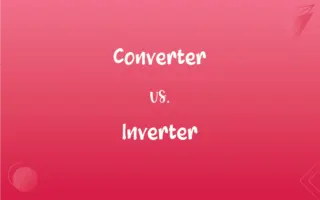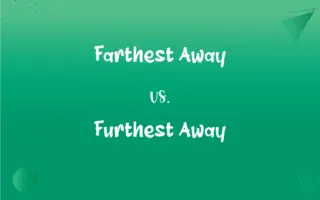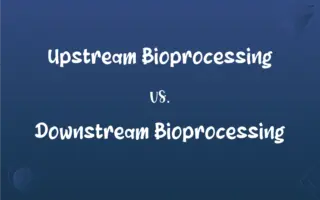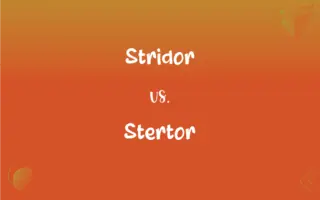GPRS vs. 3G: What's the Difference?
Edited by Harlon Moss || By Janet White || Published on January 6, 2024
GPRS is a 2G technology offering basic data services; 3G is a faster, more advanced network supporting higher data speeds and better quality.
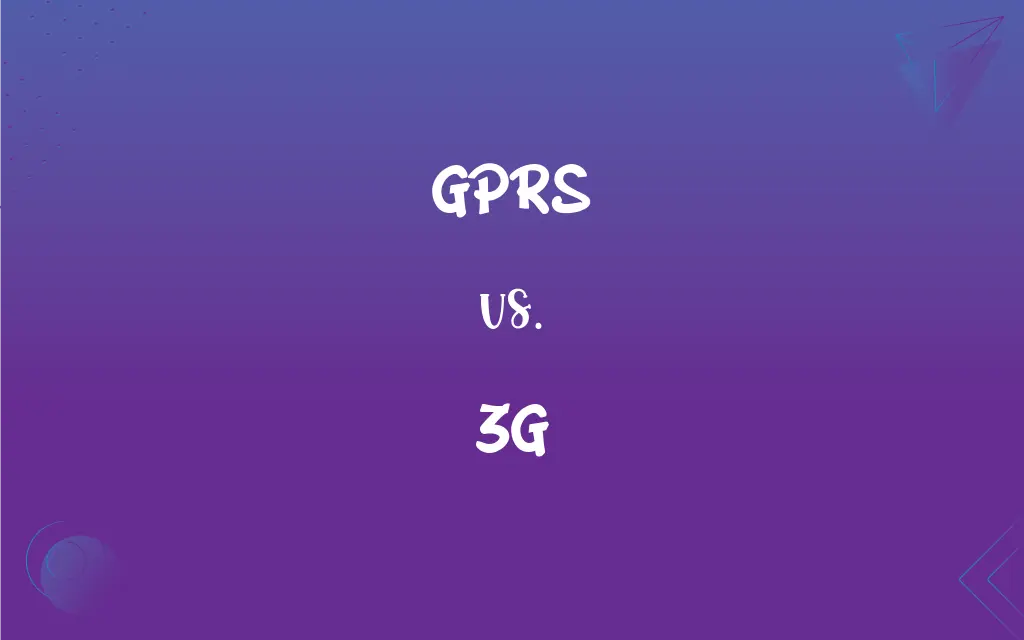
Key Differences
GPRS (General Packet Radio Service) operates on 2G networks and offers limited data speeds, suitable for basic internet tasks. In contrast, 3G (Third Generation) technology provides significantly faster data speeds, allowing for better internet browsing, streaming, and downloads.
GPRS was introduced as an upgrade to 2G networks to facilitate data transmission, serving as a stepping stone in mobile data technology. 3G emerged as a substantial upgrade over GPRS, marking a shift towards high-speed mobile internet and multimedia services.
GPRS transmits data in packets, optimizing the use of available bandwidth, but with slower speeds and higher latency. 3G networks employ more advanced packet-switching techniques, offering lower latency and a more consistent connection.
GPRS was primarily used for basic internet services like emails and simple web browsing. 3G, with its higher speeds, supports more data-intensive applications like video calling, online gaming, and streaming media.
GPRS relies on the existing 2G network infrastructure, which limited its speed and efficiency. 3G networks, on the other hand, were built with a new infrastructure, designed specifically for higher data rates and improved performance.
ADVERTISEMENT
Comparison Chart
Network Generation
2G
3G
Data Speed
Slower, up to 114 kbps
Faster, several Mbps
Latency
Higher
Lower
Use Cases
Basic browsing, emails
Video streaming, online gaming
Infrastructure
Built on 2G
Dedicated 3G infrastructure
ADVERTISEMENT
GPRS and 3G Definitions
GPRS
Provides packet data services.
GPRS enabled internet access before 3G networks.
3G
Provides faster data transmission.
Downloading apps is much quicker on 3G.
GPRS
An upgrade over traditional 2G.
GPRS was a significant step from voice-only 2G.
3G
Supports advanced mobile services.
Using 3G, I can make video calls.
GPRS
Operates at limited data speeds.
Downloading large files over GPRS takes time.
3G
A significant leap from 2G and GPRS.
3G networks made mobile internet widely accessible.
GPRS
Supports basic internet tasks.
Browsing the web on GPRS is slower.
3G
Third-generation mobile telecommunications.
Streaming video became possible with 3G.
GPRS
A 2G technology for mobile data.
I used GPRS to check emails on my phone.
3G
Offers high-speed internet access.
3G dramatically improved my browsing experience.
FAQs
Is 3G faster than GPRS?
Yes, 3G offers higher speeds.
What does GPRS stand for?
General Packet Radio Service.
Can GPRS be used for streaming?
It's possible but not ideal due to low speeds.
Was GPRS available globally?
Yes, in most regions with 2G networks.
What made 3G revolutionary?
Its high-speed data and advanced network technology.
How does 3G improve over GPRS?
With faster speeds and better connectivity.
Can GPRS support video calls?
It's technically possible but inefficient.
Did 3G replace GPRS immediately?
It was a gradual transition.
What are the typical speeds of 3G?
Several Mbps, varying by network.
Does GPRS support all internet services?
It supports basic services, but with limitations.
Can I use GPRS on a 3G phone?
Yes, if the network supports it.
Is GPRS still in use?
In some regions with older networks.
How does GPRS affect battery life?
Less demanding compared to 3G.
Can GPRS work on 3G networks?
Yes, it's backward compatible.
Did 3G networks require new phones?
Yes, phones specifically designed for 3G.
Are 3G services expensive?
Initially, they were more costly than GPRS.
Was 3G the first to offer mobile internet?
No, GPRS offered it first, albeit slower.
Was GPRS important for mobile development?
Yes, it was a key step in mobile data evolution.
Can 3G be used for online gaming?
Yes, it's suitable for that.
Is 3G being phased out?
With the advent of 4G and 5G, it's gradually being replaced.
About Author
Written by
Janet WhiteJanet White has been an esteemed writer and blogger for Difference Wiki. Holding a Master's degree in Science and Medical Journalism from the prestigious Boston University, she has consistently demonstrated her expertise and passion for her field. When she's not immersed in her work, Janet relishes her time exercising, delving into a good book, and cherishing moments with friends and family.
Edited by
Harlon MossHarlon is a seasoned quality moderator and accomplished content writer for Difference Wiki. An alumnus of the prestigious University of California, he earned his degree in Computer Science. Leveraging his academic background, Harlon brings a meticulous and informed perspective to his work, ensuring content accuracy and excellence.
